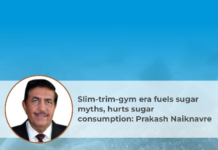Erythritol, a commonly used sugar substitute in many low-carb and sugar-free products, might not be as safe as previously thought. New research from the University of Colorado Boulder shows that erythritol, once hailed as a safe, low-calorie alternative to sugar, could increase the risk of stroke by altering brain blood vessel function.
The study, published in the Journal of Applied Physiology, found that erythritol affects brain cells in ways that may make strokes more likely.
“Our findings add to growing concerns that some sweeteners promoted as healthy may come with serious health risks,” said Christopher DeSouza, senior author and professor of integrative physiology, reported Science Daily.
Erythritol, a sugar alcohol commonly made by fermenting corn, has been used in foods since it was approved by the U.S. Food and Drug Administration in 2001. With nearly zero calories, low impact on blood sugar, and about 80% of the sweetness of regular sugar, it’s a popular ingredient in many low-carb, keto, and “sugar-free” products.
One recent study involving 4,000 people in the U.S. and Europe found that men and women with higher circulating levels of erythritol were significantly more likely to have a heart attack or stroke within the next three years.
To explore why, DeSouza and graduate student Auburn Berry treated human brain blood vessel cells with an amount of erythritol equivalent to what’s found in a typical sugar-free drink. Within just three hours, the researchers saw major changes: the cells produced less nitric oxide (which helps relax blood vessels) and more endothelin-1 (which tightens them). They also showed lower production of a natural clot-dissolving substance and higher levels of damaging molecules called free radicals.
“If your blood vessels are more constricted and you’re less able to dissolve clots, your risk of stroke increases,” said Berry. “Our research shows not only that this can happen, but also how it happens.”
While the study was limited to lab work on human cells, the findings support earlier research and raise concerns about the long-term health effects of erythritol, especially for people who consume multiple servings of it daily.
DeSouza urged consumers to check food labels and be aware of ingredients like erythritol or “sugar alcohol.”
“Considering the evidence from both our study and others, it makes sense to keep an eye on how much of these sweeteners you’re consuming,” he said.


















